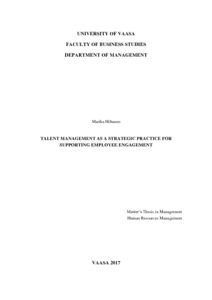Talent Management as a Strategic Practice for Supporting Employee Engagement
Hiltunen, Marika (2017)
Kuvaus
Opinnäytetyö kokotekstinä PDF-muodossa.
Tiivistelmä
The attraction and retention of talents is one of the most important focus areas in today’s organizations. Moreover, talented employees are seen as strategic assets since in the end people execute and lead businesses. In order to attract and keep these important employees, human resource management focuses nowadays more on talent management, which includes strategies and practices for talent attraction, talent development and engagement. Due to its importance, talent management as a concept has gotten attention among previous research. The aim of this study is to examine more deeply, what is the strategic role of talent management in overall business strategy, its main focus areas and moreover, how to support better employee engagement with talent management strategies.
The theoretical framework of this study is built around talent management as a concept, its processes, yet also employee engagement and different talent management strategies supporting it. In this study the aim is to explain talent management and its connection to employee engagement both through literature and empirical research data. The research has been executed with qualitative research design. The data were collected through interviews with six different informants from five organizations, which all have talent management practices in place. All of the informants are specialists in HR related matters. Finally, the data was being analyzed with content analyze as a research method.
The main findings of this research suggest that talent management has an important role in business strategy; it aims at placing employees with right skills to right positions, and highlights the key competencies needed in order for the company to succeed. Moreover, it is vital to develop important employees in order to retain them. Talent management has a strong connection to employee engagement, since all talent management processes aim at engaging employees better. Most important strategies for engagement in talent attraction phase are fair recruitment processes and emphasizing employer values. Thus, even more important are the internal processes for employees, such as individual development opportunities, focus on career paths, responsibilities and great leadership.
The theoretical framework of this study is built around talent management as a concept, its processes, yet also employee engagement and different talent management strategies supporting it. In this study the aim is to explain talent management and its connection to employee engagement both through literature and empirical research data. The research has been executed with qualitative research design. The data were collected through interviews with six different informants from five organizations, which all have talent management practices in place. All of the informants are specialists in HR related matters. Finally, the data was being analyzed with content analyze as a research method.
The main findings of this research suggest that talent management has an important role in business strategy; it aims at placing employees with right skills to right positions, and highlights the key competencies needed in order for the company to succeed. Moreover, it is vital to develop important employees in order to retain them. Talent management has a strong connection to employee engagement, since all talent management processes aim at engaging employees better. Most important strategies for engagement in talent attraction phase are fair recruitment processes and emphasizing employer values. Thus, even more important are the internal processes for employees, such as individual development opportunities, focus on career paths, responsibilities and great leadership.
